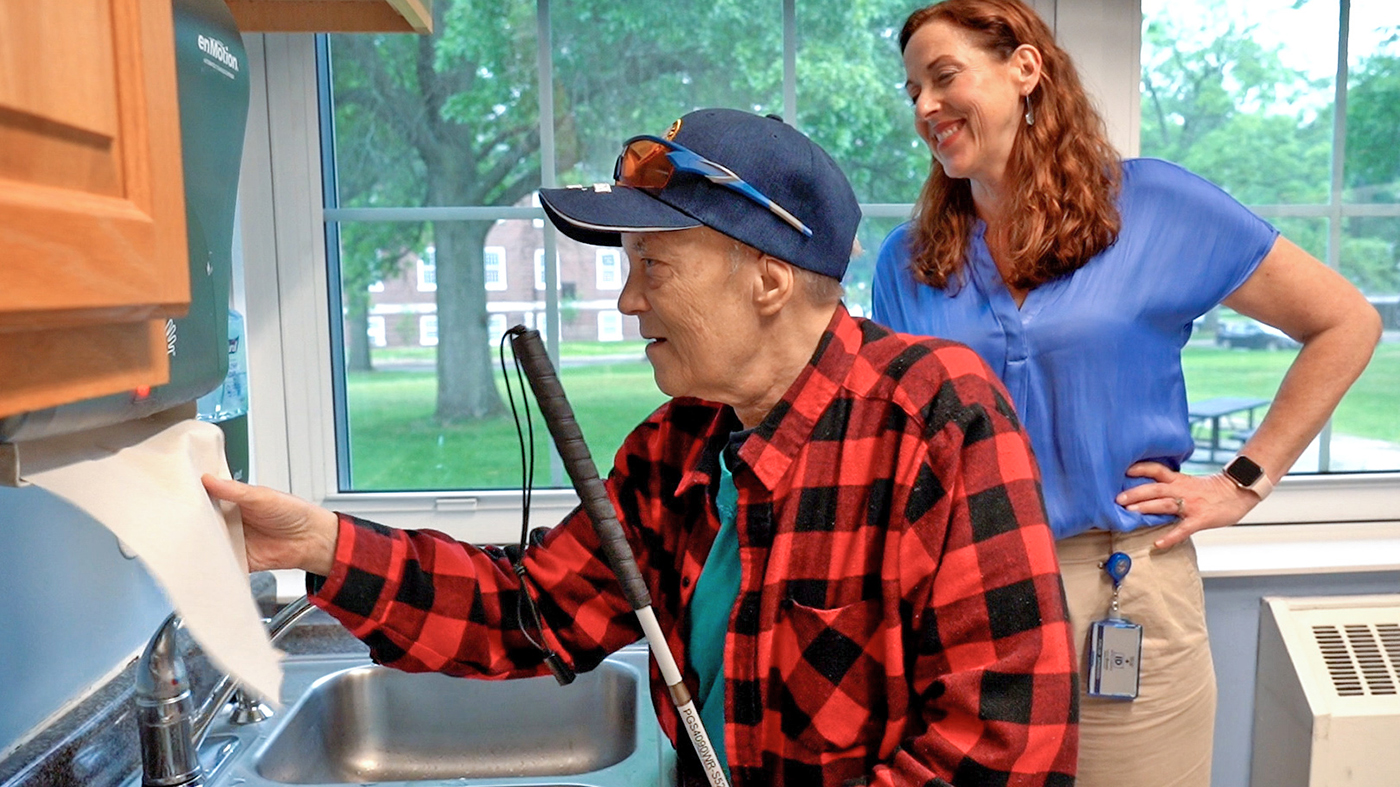Nearly 20 million people in the U.S. live with blindness, low vision, or significant visual impairment. The risk of vision loss increases with age, often due to medical conditions and eye diseases such as diabetic retinopathy, macular degeneration, glaucoma, cataracts and more.
The staff of Battle Creek VA’s Blind and Low Vision Rehabilitation service are actively engaged each day with Veterans residing in Michigan, Indiana and parts of Ohio to help them navigate life to better live independently through vision enhancing devices, technological tools and other related training.
“Our clinic offers blind and low-vision rehabilitation to Veterans who have reduced vision, enabling them to better live their life without vision,” said Kimberley Lambe, blind rehabilitation specialist. “That comes with everything from their activities of daily living, cooking, medication management, accessing computers and smartphones, using low-vision equipment and how to move from ‘Point A to Point B’ safely.”
VA has 13 Blind Rehabilitation Centers
The first VA Blind and Low Vision Clinic opened at Hines VA. VA now has 13 blind rehabilitation centers, approximately 165 Visual Impairment Services team coordinators, 93 Blind Rehabilitation outpatient specialists, 53 Intermediate, Advanced, and VISOR clinics/programs and approximately 575 staff across the U.S.
“Timing is really important because if someone gets a diagnosis and are told there is nothing that can be done for their vision and if they don’t do anything with that for an extended period of time, their life has become so small and their opportunity to become successful is reduced. This really makes referral time very important,” Lambe said.
An added benefit of VA health care is the communication optometrists and ophthalmologists who can reach out to the Blind and Low Vision Rehabilitation Service and make the direct connection to help Veterans as soon as possible.
“I need to learn to be independent.”
Navy Veteran Ed Howland has lost nearly all vision due to diabetic retinopathy, which had been not diagnosed until later in life. He has had to move in with his mother, 94, who is now unable to assist with his daily activities and mobility.
“Because of her health, I need to learn how to be much more independent than what I was previously and rely less on her for things like reading my mail and preparing food,” said Howland. “This has been so important to me as I gain more orientation, mobility, training in technology for screen readers and smartphone, and doing other daily activities around the house.”
Battle Creek VA is also helping him with extended in-patient training at the facility to better strengthen his mobility, which is just one of many services offered.
Additionally, the Blind and Low Vision Service helps Veterans with:
- Orientation and mobility training, and accessible GPS systems.
- Magnification devices for near, distance and intermediate tasks.
- iOS has opened a whole new world for those that are visually impaired.
- Activities of Daily Living strategies for medication and home management.
“This is extremely helpful and improving my situation in just a short period of time. My goal is to be as functionally independent as possible. This is the best training I’ve had in comparison to other training I’ve received,” said Howland.
“We base all their training on their individual goals, so when we first meet we talk about those and then we see them achieving those goals,” said Lambe.
Last fiscal year, Battle Creek VA saw 681 new Veterans in their Blind and Low Vision clinic and provided 3960 training sessions. So far in fiscal year 2024, they have seen 509 new Veterans and provided 509 training sessions.
Because of the loss of vision, many Veterans begin to experience isolation and lack of social engagement. The result can have a psychological effect that can present anxiety and depression. To help curb these outcomes, the clinic also works to provide a Whole Health class once a month, a self-defense course, a monthly support group and sports outings that include bowling, fishing and golf.
“In the VISOR clinic, we believe recreational opportunities are really important because they offer opportunities for Veterans to get together and be with other people that have visual impairments,” Lambe said.
Lambe and the staff in the Blind and Low Vision Rehabilitation Service understand receiving hard news is difficult, but they’ve made it their mission to turn these situations into an opportunity to help Veterans learn that they can still be capable and functional.
“I think it’s really incredible to be a part of someone’s journey where they come to us with trust, trying things very much out of their comfort zone, like feeling very limited, then to watch them grow and develop skills, and be able to do things they didn’t were possible is just a wonderful thing to be a part of,” Lambe said.
Topics in this story
More Stories
Bob Jesse Award celebrates the achievements of a VA employee and a team or department that exemplifies innovative practices within VA.
The Medical Foster Home program offers Veterans an alternative to nursing homes.
Watch the Under Secretary for Health and a panel of experts discuss VA Health Connect tele-emergency care.







For non Veterans your state could have a Commission for the Blind or Blind Services in your area. I am a Rehabilitation Teacher for the Blind and Visually Impaired in my state and I help all ages access the service they need. Most people don’t know about my Agency. Look online or in the phone book for your state.
I am a 100% T&P Disabled veteran whose wife recently lost her eyesight due to macular degeneration and is classsififed as legally blind. Is she eligible to participate in the VA Blind Rehab Center program?
This may be a good question for a social worker at the VA where you currently receive your healthcare from. Additionally, pending on your state , the state may have something to offer as well.
i may be coming there for something vision is starting to fade